- 1Physicians Committee for Responsible Medicine, Washington, DC, United States
- 2Charles E. Schmidt College of Medicine, Florida Atlantic University, Boca Raton, FL, United States
- 3Icahn School of Medicine at Mount Sinai, New York, NY, United States
- 4School of Medicine, University of Utah, Salt Lake City, UT, United States
- 5Adjunct Faculty, George Washington University School of Medicine and Health Sciences, Washington, DC, United States
Objective: Evidence suggests that changes in dietary advanced glycation end-products (AGEs) may influence body weight, but the effects of different dietary patterns remain to be explored.
The aim of this study was to compare the effects of a Mediterranean and a low-fat vegan diet on dietary AGEs and test their association with body weight.
Materials and methods: In this randomized cross-over trial, 62 overweight adults were assigned to a Mediterranean or a low-fat vegan diet for 16-week periods in random order, separated by a 4-week washout. Body weight was the primary outcome. Three-day diet records were analyzed using the Nutrition Data System for Research software and dietary AGEs were estimated, using an established database. Statistical approaches appropriate for crossover trials were implemented.
Results: Dietary AGEs decreased by 73%, that is, by 9,413 kilounits AGE/day (95% −10,869 to −7,957); p < 0.001, compared with no change on the Mediterranean diet (treatment effect −10,303 kilounits AGE/day [95% CI −13,090 to −7,516]; p < 0.001). The participants lost 6.0 kg on average on the vegan diet, compared with no change on the Mediterranean diet (treatment effect −6.0 kg [95% CI −7.5 to −4.5]; p < 0.001). Changes in dietary AGEs correlated with changes in body weight (r = +0.47; p < 0.001) and remained significant after adjustment for total energy intake (r = +0.39; p = 0.003).
Conclusion: Dietary AGEs did not change on the Mediterranean diet but decreased on a low-fat vegan diet, and this decrease was associated with changes in body weight, independent of energy intake.
Clinical trial registration https://clinicaltrials.gov/, identifier NCT03698955
Introduction
Approximately 70% of US adults are overweight (1), and the extra weight is often associated with an increased cardiometabolic risk (2), partly via an accelerated production of advanced glycation end products (AGEs). AGEs are a large heterogenous group of compounds formed during a non-enzymatic reaction of the carbonyl groups of sugars with free amino groups in protein (3). They cause inflammation and oxidative stress, and thus accelerate the development of chronic diseases, particularly type 2 diabetes and cardiovascular disease. While AGEs are generated constantly during metabolism, they are also ingested through the diet (4, 5). Several randomized interventional trials have shown that dietary AGE restriction ameliorates insulin resistance in obese people with metabolic syndrome (6, 7).
Thermally prepared foods, particularly of animal origin, are rich in AGEs, which may be very flavorful, and therefore enhancing their palatability and consumption, thus promoting weight gain. Databases with the AGE content of different food items have been published in the literature and provide the basis to estimate AGE content in consumed foods, as well as the design of low-AGE diets (5, 8). We have extensively used one of these databases (5) including ELISA measurement of carboxymethyllysin (CML) and shown an association between dietary AGE intake and circulating AGE levels, as well as markers of oxidative stress, inflammation, innate defenses and insulin resistance in different populations (5–7).
Mediterranean and vegan diets have been recognized as healthy dietary patterns that may be beneficial for weight loss and cardiometabolic health, but the extent to which these dietary patterns affect AGE ingestion and the resulting associations between AGEs and body weight still need to be explored.
The aim of this secondary analysis of a randomized crossover trial, which compared a Mediterranean and low-fat vegan diet head-to-head in overweight adults and showed a greater weight loss and improvements in cardiometabolic outcomes on the low-fat vegan diet (9), was to compare the effects of these two diets on dietary AGEs and test their association with body weight. We hypothesized that a low-fat vegan diet would result in a reduction of dietary AGEs, compared with the Mediterranean diet, and that these changes would be associated with changes in body weight.
Materials and methods
Study design and eligibility
The methods of the overall study have been described in detail previously (9). Briefly: This randomized, cross-over trial took place between February and October 2019 in Washington, DC. We enrolled adults, aged 30–76 years, with a body mass index between 28 and 40 kg/m2. Exclusion criteria included type 1 diabetes, smoking, pregnancy or lactation, alcohol or drug abuse, or already following a vegan or Mediterranean diet. The study was conducted in accordance with the Declaration of Helsinki, and the study protocol was approved by the Advarra Institutional Review Board, located in Columbia, MD, USA, on September 20, 2018 (protocol identification number Pro00029777). The study was registered on ClinicalTrials.gov (ID: NCT03698955). All participants gave informed, written consent.
Randomization and study groups
Participants were randomized in a 1:1 ratio into 2 groups. Group 1 started with a Mediterranean diet for 16 weeks, followed by a 4-week wash-out period, and then switched to a low-fat vegan diet for 16 weeks. Group 2 followed a low-fat vegan diet for 16 weeks, and after a 4-week wash-out period, they adopted the Mediterranean diet for 16 weeks. Participants were assessed at weeks 0, 16, 20, and 36.
The Mediterranean diet was based on the PREDIMED protocol (10), which includes ≥2 servings/day of vegetables, ≥2–3 servings/day of fresh fruits, ≥3 servings/week of legumes, ≥3 servings/week of fish or shellfish, and ≥3 servings/week of nuts or seeds, and favors lean white meats over red meats. Participants were discouraged from consuming cream, butter, margarine, processed meats, sweetened beverages, pastries, and processed snacks. Participants were instructed to use the provided extra virgin olive oil (50 g daily) as their main culinary fat.
The low-fat vegan diet consisted of fruits, vegetables, grains, and legumes. It was an ad libitum diet, with no instructions on portion sizes. Animal products and added fats were excluded and vitamin B12 was supplemented (a supplement with 500 μg/day was provided). Both diets were ad libitum diets, with no meals provided for either intervention. Alcohol was limited to one beverage/day for women, and two beverages/day for men. Participants were instructed to keep their physical activity and prescribed medications constant, unless otherwise directed by their personal physicians. Participants attended weekly classes specific to their assigned diets for the whole intervention period. These classes provided nutrition education, recipes, meal plans, as well as group support.
Body weight was measured, using an electronic scale accurate to 0.1 kg. Body composition was measured by dual energy x-ray absorptiometry (Lunar iDXA, GE Healthcare; Madison, WI) with Encore® 2005 v.9.15.010 software, equipped with the CoreScan module (GE Healthcare, Madison, WI) to measure visceral adipose tissue volume. Diet adherence was checked weekly, using short questionnaires that captured all important components of each diet. Participants submitted a 3-day diet record at weeks 0, 16, 20, and 36. Dietary data were reviewed and analyzed by a Registered Dietitian or a team member certified in Nutrition Data System for Research version 2018 (Nutrition Coordinating Center, University of Minnesota, Minneapolis, MN) (11).
In a post-hoc analysis of above data, AGE scores were assigned to each food item, using a published database of AGE content that has been previously used in epidemiologic studies to estimate dietary AGE intake (12–14). Consistent with previously published methodology (12–14), each food item identified was assigned a dietary AGE value in kilounits AGE/gram of food, which was then multiplied by the number of grams of this food consumed per day. The dietary AGE values for all foods consumed during the day were then summed to provide a total dietary AGE value in kilounits AGE/day per participant. The database used contains a large number of food items, the AGE content of which is expressed as kilounits AGE/gram of food (5). Whenever a food present in the Nutrition Data System for Research was not listed in the dietary AGE database, a value was assigned based on the similarity of nutrient ingredients and cooking methods with foods listed in the dietary AGE database. This was done by a co-author (JU) who was masked regarding dietary intervention assignment. Less than 10% of food items in the current cohort was estimated this way and the estimation included in the calculation of the total dietary AGE intake. In the database, carboxymethyllysin-AGE content was estimated using ELISA based on monoclonal anti- carboxymethyllysin antibody (5).
Statistical analysis
Power analysis: Assuming a 70% reduction on the vegan diet, which is a conservative estimate based on our previous publication (15), and a 10% reduction on the Mediterranean diet, with a standard deviation of 9,800 kilounits AGE/day (ku/day), the power to detect the 8,000-point difference is 99.99% with 62 participants, and 99.98% with the 50 participants who completed the entire crossover study.
The statistical analysis was performed in all participants with complete data across all timepoints. Treatment effect, under the assumption of no carryover effect in a crossover trial, was quantified by comparing changes from baseline (from week 0 to week 16, and from week 20 to week 36), within study participants while on Mediterranean versus vegan diet, using paired t-tests (an approach yielding estimates and significance levels identical to a mixed model analysis controlling for participant). Thus, the reported treatment effect is the mean difference between each participant’s outcomes on the vegan versus the Mediterranean diet. Carryover effect was then assessed by comparing treatment effects by the first diet that each participant received using two-sample t-tests (an approach equivalent to testing for an interaction between treatment and first diet in an analysis of variance model). Because of a detected carry-over effect (difference in magnitude of treatment effect according to the first diet each participant received) for several outcomes including total AGEs, period-specific estimates of treatment effects were also determined for all outcomes. These treatment effects were compared by (within-period) diet using two-sample t-tests. Within each intervention, paired comparison t-tests were also calculated to test whether the changes from baseline to 16 weeks in each treatment period were statistically significant. The statistician was blinded to dietary interventions. Results are presented as means with 95% confidence intervals (CI); formal correction for multiple comparisons was not performed as this study of secondary outcomes is viewed as hypothesis-generating.
Results
Participant characteristics
Of 506 people screened by telephone, 62 met participation criteria and were randomly assigned to start with the Mediterranean (n = 32) or the vegan diet (n = 30) diet (Supplementary Figure 1 and Supplementary Table 1).
Dietary AGEs
Dietary AGEs decreased by 73% on the low-fat vegan diet, that is by 9,413 kilounits AGE/day (95% −10,869 to −7,957); p < 0.001, compared with no change on the Mediterranean diet (treatment effect −10,303 kilounits AGE/day [95% CI −13,090 to −7,516]; p < 0.001). The reduction of dietary AGEs on the low-fat vegan diet came mainly from excluding the consumption of meat (41%), and further from minimizing the consumption of added fats (27%) and avoiding dairy products (14%; see Table 1). The changes in dietary AGEs in response to both diets during the whole study are shown in Figure 1 and Table 2. There was a statistically significant carryover effect for total AGEs (p = 0.01), and therefore an additional ANOVA for repeated measures was performed, conservatively assessing treatment effect from the first study period alone (−9,578 ku/day [95% CI −13,014 to −6,143]; p < 0.001; Table 3).
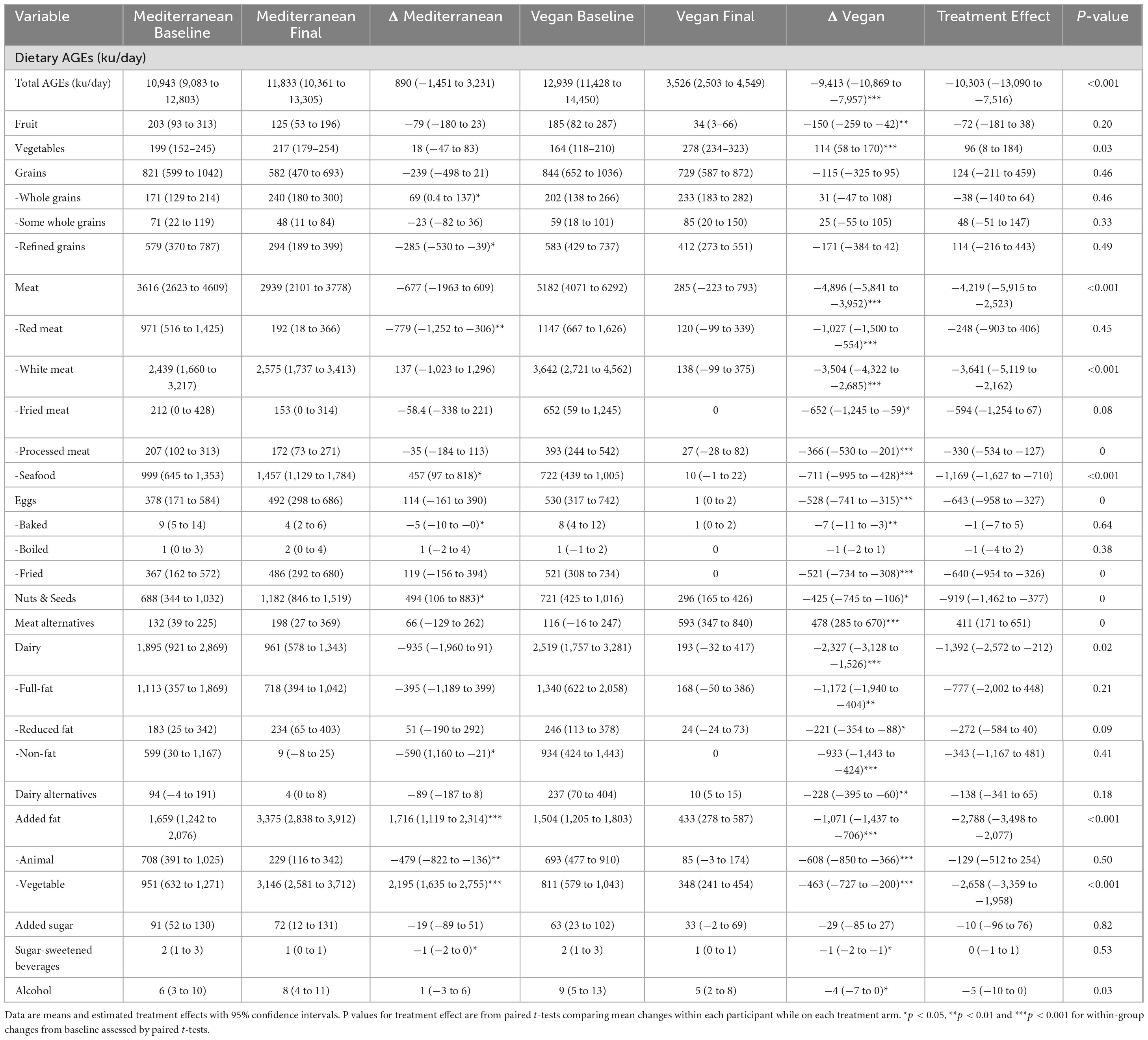
Table 1. Changes in dietary Advanced Glycation End-Products (AGEs) during the study comparing a Mediterranean and low-fat vegan diet.
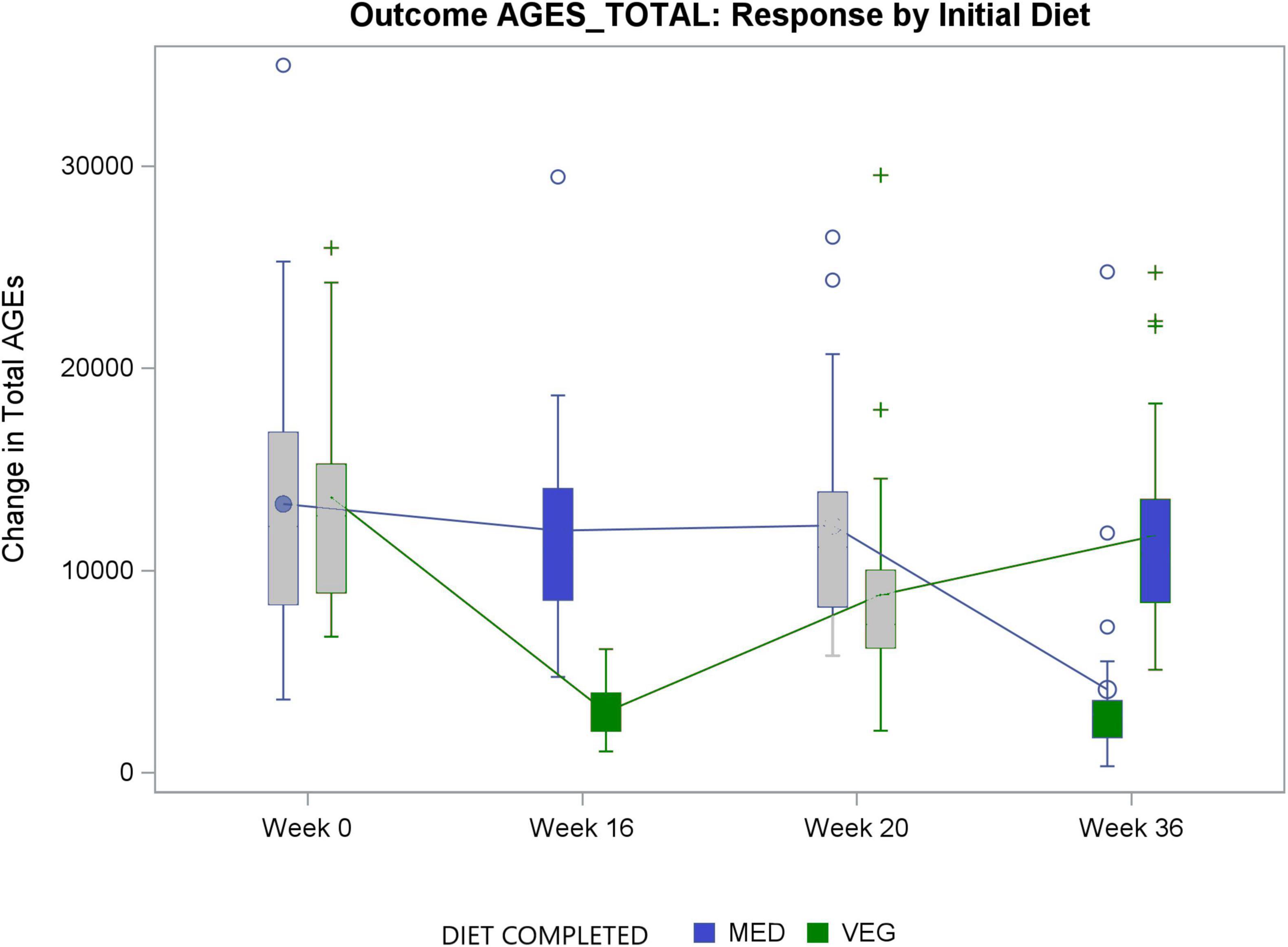
Figure 1. Total AGEs and their changes in response to both diets. MED, The Mediterranean diet; VEG, The low-fat vegan diet.
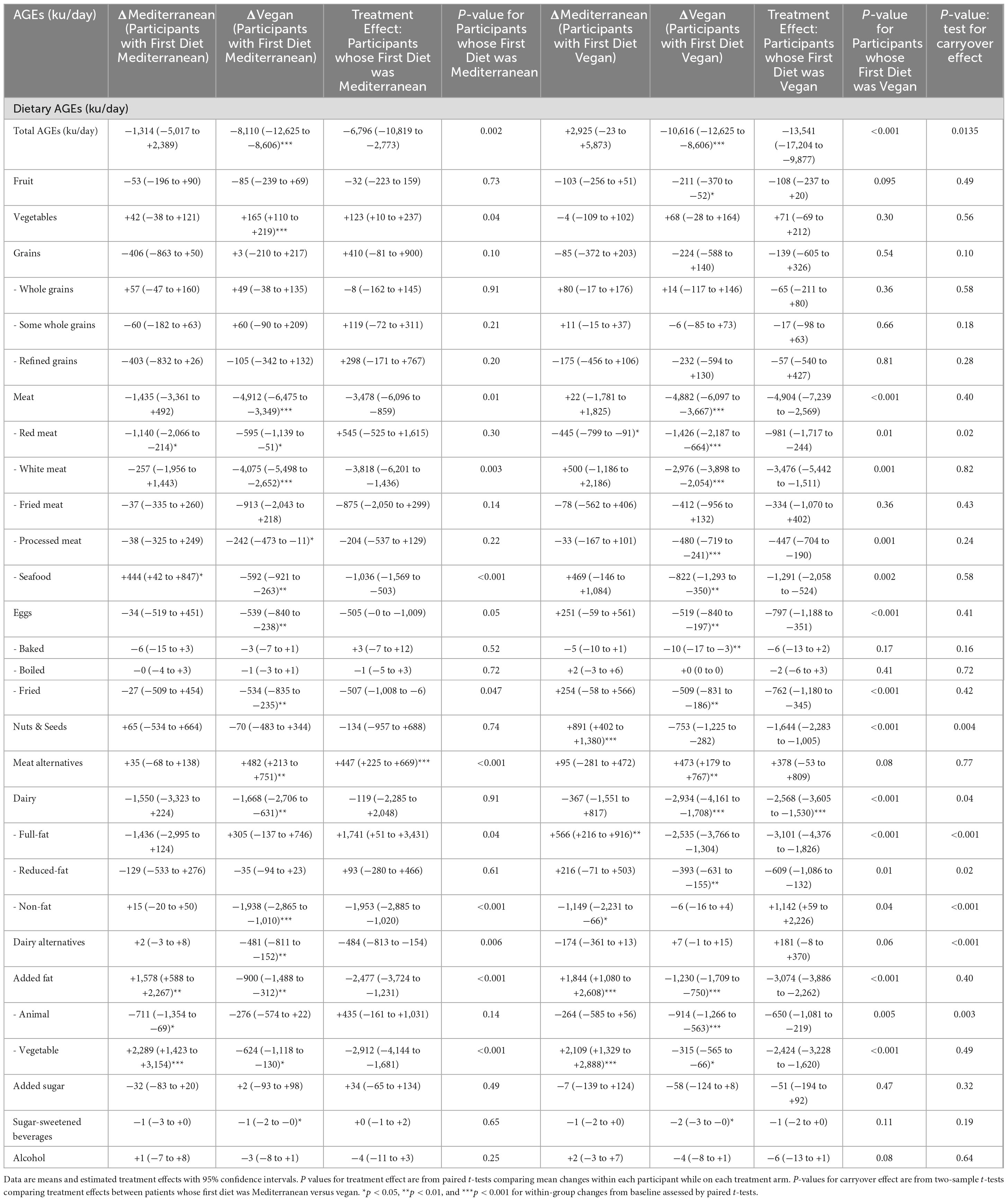
Table 2. Changes in dietary Advanced Glycation End-Products (AGEs) and estimated treatment effects for the first and the second period of the study, comparing a Mediterranean and a low-fat vegan diet.
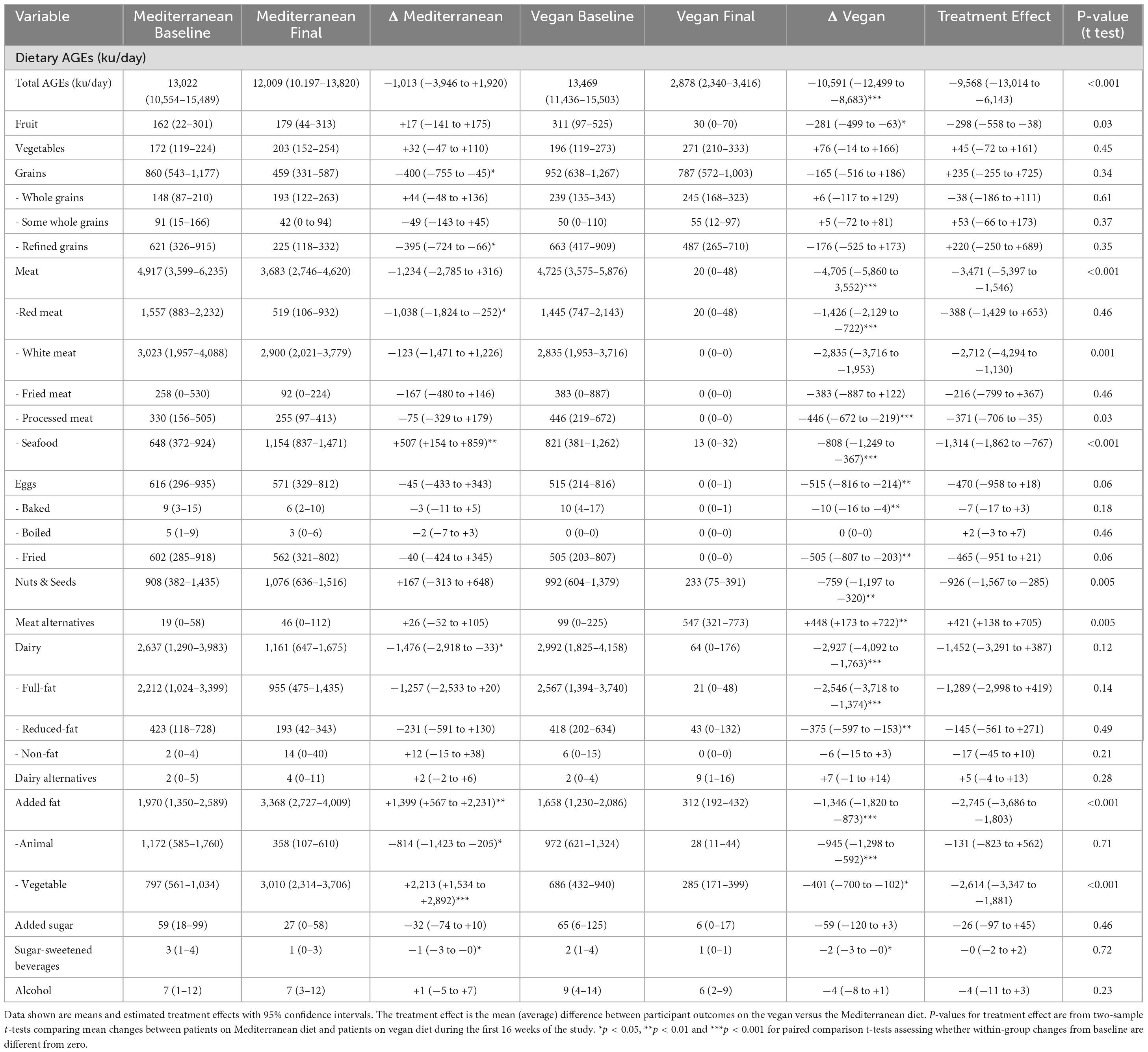
Table 3. Changes in dietary Advanced Glycation End-Products (AGEs), comparing a Mediterranean and low-fat vegan diet, in the first 16 weeks of the study.
Body weight and body composition
As reported earlier (9), the participants lost 6.0 kg on average on the vegan diet, compared with no change on the Mediterranean diet (treatment effect −6.0 kg [95% CI −7.5 to −4.5]; p < 0.001). Most of the weight loss on the vegan diet was attributable to a reduction in fat mass (treatment effect −3.4 kg [95% CI −4.7 to −2.2]; p < 0.001) and visceral fat volume (treatment effect −314.5 cm3 [95% CI −446.7 to −182.4]; p < 0.001). Changes in dietary AGEs correlated with changes in body weight (r = +0.48; p < 0.001 for period 1; Figure 2) and remained significant after adjustment for total energy intake (r = +0.39; p = 0.003).
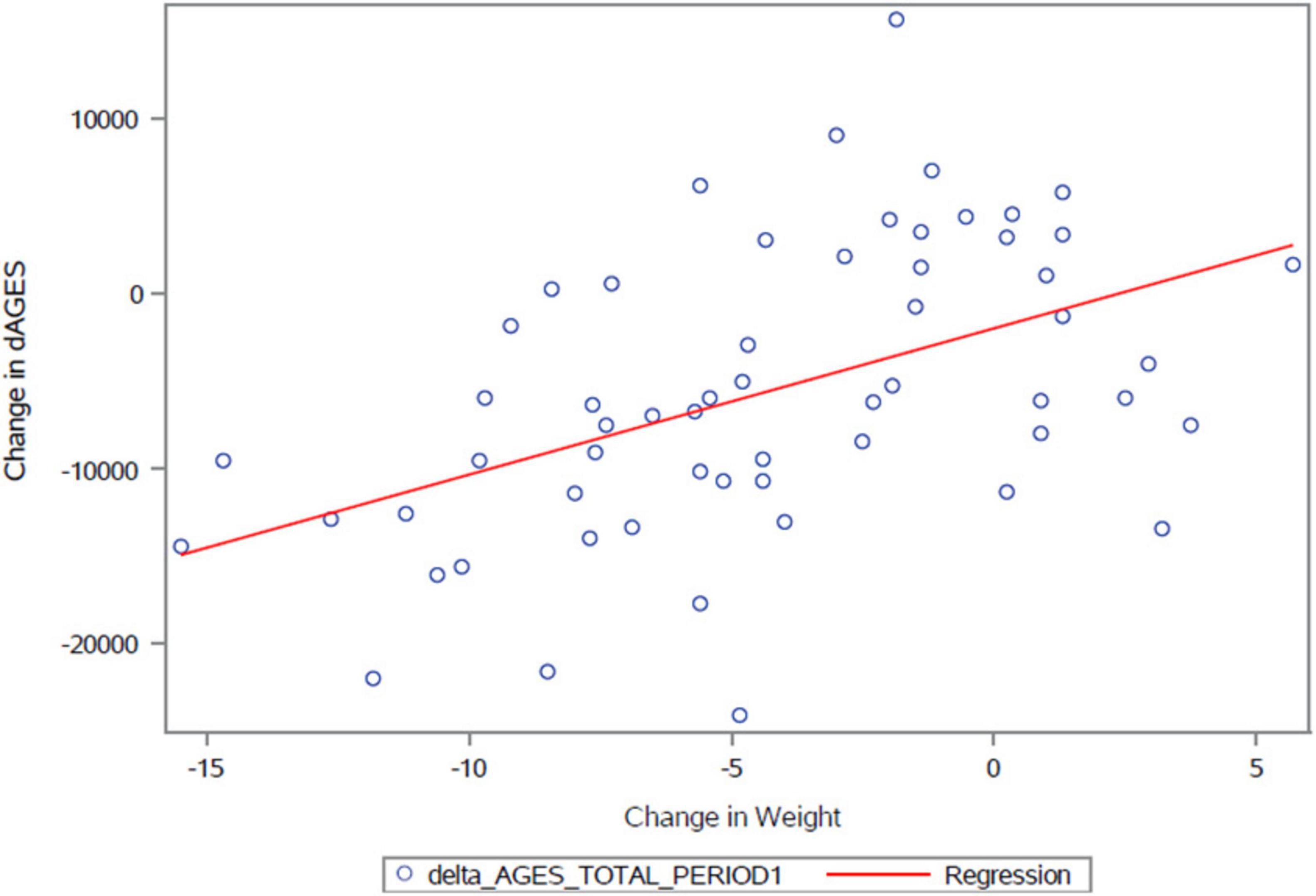
Figure 2. Relationship between changes in dietary AGEs and changes in body weight in the first study period; r = +0.48; p < 0.001.
Discussion
This 36-week crossover trial, which compared a Mediterranean and a low-fat vegan diet head-to-head, demonstrated a 73% reduction in dietary AGEs on the low-fat vegan diet, compared with no change on the Mediterranean diet. Changes in AGEs strongly correlated with weight changes, independent of energy intake.
The Mediterranean diet has been previously shown to reduce dietary and serum AGEs in elderly adults, compared with a Western diet rich in saturated fat (16). In contrast to the experimental Western diet used in this study, which contained 22% energy in the form of saturated fat, our study population was more health-conscious at baseline and consumed only 10% energy from saturated fat, which may have explained no observed reduction in dietary AGEs on the Mediterranean diet in the current study. A separate study of a Mediterranean diet in people with type 2 diabetes with previous cardiovascular events also demonstrated a reduction in serum AGEs, compared with a control low-fat diet, and both of these diets reduced the dietary AGEs (17). The low-fat diet in this study contained animal products and was higher in fat (30% energy) compared with our study (17% energy), which may have played a role in a less-expressed reduction in the dietary AGEs compared with the current study. The reduction in dietary AGEs with a low-fat vegan diet has been reported previously in overweight adults (15) and in postmenopausal women (18), in both cases compared with a control (habitual) diet. This study, for the first time, compares the effects with a Mediterranean diet to a low-fat vegan diet, and shows a beneficial effect of a low-fat vegan diet.
This study also elucidated which dietary changes contributed most to the reduction of dietary AGEs on the low-fat vegan diet, namely excluding the consumption of meat, minimizing added fat, and avoiding dairy products. These findings are supported by the relatively low AGE content in plant foods, compared with animal-derived and high-fat foods (5). Randomized interventional trials have shown that modifying cooking methods so as to reduce dietary AGEs ameliorates insulin resistance in obese people with metabolic syndrome (6, 7). A low-fat vegan diet achieves a significant reduction in dietary AGEs through qualitative dietary changes, without changing food preparation techniques (15). Plant-based diets have been shown to reduce the risk of developing the metabolic syndrome and type 2 diabetes by about one half (19, 20), and the lower intake of AGEs on these diets may partly explain their benefits.
AGEs can contribute to the pathogenesis of insulin resistance and increased body weight through several mechanisms (21), including (1) a direct modification of signaling molecules, such as insulin itself, which reduces its biological activity (22) and affinity for the insulin receptor, hereby impairing insulin signaling, or the modification of the three arginine residues in the AMP binding site of AMP kinases, decreasing their activity (23); and (2) interference with activation of downstream proteins involved in cell insulin signaling, including IRS-1 and Akt, through RAGE-dependent induction of proinflammatory cytokines and reactive oxygen species (24).
The current trial did not observe any effect of a Mediterranean diet on weight loss, which is in line with previous studies that did not include energy restriction or exercise. The Lyon Diet Heart Study (25) used a Mediterranean diet supplemented with margarine enriched in an alpha-linolenic acid in studying secondary prevention of cardiovascular disease, but found a small weight gain (1.4 kg) during the 2-year study (26). In the PREDIMED study, which included mostly overweight people (27), the weight loss in the first 3 months was very small (0.19 kg in the olive oil-supplemented group and 0.26 kg in the nut-supplemented group) (10).
A 2020 large prospective study that included more than 255,000 adults from ten European countries showed that increased consumption of dietary AGEs was associated with additional weight gain over the 5-year follow-up period (28). Increased AGEs have also been associated with markers of insulin resistance and inflammation, and the risk of developing the metabolic syndrome (29). Some studies suggest that accumulation of AGEs in the extracellular matrix plays a key role in the development of obesity-related adipose tissue dysfunction (30, 31), and the reduction in their intake may therefore be an effective strategy to counteract these negative consequences.
This study has several strengths. The cross-over design enabled the research team to directly compare the effects of a Mediterranean and a low-fat diet. The reasonably high retention (84%) suggests that both diets are doable and acceptable. The study duration was long enough to allow sufficient time for metabolic adaptation (32). Because this was a free-living study, the results can readily translate to nonclinical settings. The study also has limitations. As we examined a modestly large number of outcomes, there is a possibility of some false positive findings due to multiple comparisons. However, the treatment effects reported for total dietary AGEs and several other outcomes, with unadjusted p-values < 0.001, remain significant at the 0.05 level after conservative (Bonferroni) correction for the total number of outcomes examined. Although self-reported overall adherence to both diets was high, the limitations of self-reported dietary intake are well-known. The detected carry-over effect for total dietary AGEs necessitated more detailed statistical analyses, including a conservative estimate from an ANOVA for repeated measures from the first 16 weeks of the study alone; findings from this alternate analysis were generally very consistent with the full crossover model.
Conclusion
This study suggests that a low-fat vegan diet is an effective strategy for reduction in dietary AGEs and for weight loss, compared with a Mediterranean diet. Further studies are needed to confirm these findings.
Data availability statement
The raw data supporting the conclusions of this article will be made available by the authors, without undue reservation.
Ethics statement
The studies involving humans were approved by the Advarra Institutional Review Board, located in Columbia, MD, USA. The studies were conducted in accordance with the local legislation and institutional requirements. The participants provided their written informed consent to participate in this study.
Author contributions
HK: Conceptualization, Investigation, Methodology, Supervision, Writing – original draft. TZ-M: Data curation, Methodology, Project administration, Writing – review and editing. GM: Data curation, Project administration, Writing – review and editing. EE: Project administration, Writing – review and editing. AP: Project administration, Writing – review and editing. JU: Methodology, Project administration, Supervision, Writing – review and editing. RH: Formal analysis, Writing – review and editing. NB: Funding acquisition, Methodology, Supervision, Writing – review and editing.
Funding
The author(s) declare that financial support was received for the research, authorship, and/or publication of this article. This work was funded by the Physicians Committee for Responsible Medicine.
Conflict of interest
The authors declare that the research was conducted in the absence of any commercial or financial relationships that could be construed as a potential conflict of interest.
Publisher’s note
All claims expressed in this article are solely those of the authors and do not necessarily represent those of their affiliated organizations, or those of the publisher, the editors and the reviewers. Any product that may be evaluated in this article, or claim that may be made by its manufacturer, is not guaranteed or endorsed by the publisher.
Supplementary material
The Supplementary Material for this article can be found online at: https://www.frontiersin.org/articles/10.3389/fnut.2024.1426642/full#supplementary-material
Abbreviations
AGEs, advanced glycation end-products; BMI, Body Mass Index.
References
1. National Institute of Diabetes and Digestive, and Kidney Diseases.Overweight & obesity statistics. Bethesda, MD: National Institute of Diabetes and Digestive, and Kidney Diseases (2018).
2. Pillon N, Loos R, Marshall S, Zierath J. Metabolic consequences of obesity and type 2 diabetes: Balancing genes and environment for personalized care. Cell. (2021) 184:1530–44. doi: 10.1016/j.cell.2021.02.012
3. Uribarri J, del Castillo M, de la Maza MP, Filip R, Gugliucci A, Luevano-Contreras C, et al. Dietary advanced glycation end products and their role in health and disease. Adv Nutr. (2015) 6:461–73.
4. Uribarri J, Cai W, Sandu O, Peppa M, Goldberg T, Vlassara H. Diet-derived advanced glycation end products are major contributors to the body’s AGE pool and induce inflammation in healthy subjects. Ann N Y Acad Sci. (2005) 1043:461–6. doi: 10.1196/annals.1333.052
5. Uribarri J, Woodruff S, Goodman S, Cai W, Chen X, Pyzik R, et al. Advanced glycation end products in foods and a practical guide to their reduction in the diet. J Am Diet Assoc. (2010) 110:911–916.e12. doi: 10.1016/j.jada.2010.03.018
6. Vlassara H, Cai W, Tripp E, Pyzik R, Yee K, Goldberg L, et al. Oral AGE restriction ameliorates insulin resistance in obese individuals with the metabolic syndrome: A randomised controlled trial. Diabetologia. (2016) 59:2181–92. doi: 10.1007/s00125-016-4053-x
7. de Courten B, de Courten M, Soldatos G, Dougherty S, Straznicky N, Schlaich M, et al. Diet low in advanced glycation end products increases insulin sensitivity in healthy overweight individuals: A double-blind, randomized, crossover trial. Am J Clin Nutr. (2016) 103:1426–33. doi: 10.3945/ajcn.115.125427
8. Scheijen J, Clevers E, Engelen L, Dagnelie P, Brouns F, Stehouwer C, et al. Analysis of advanced glycation endproducts in selected food items by ultra-performance liquid chromatography tandem mass spectrometry: Presentation of a dietary AGE database. Food Chem. (2016) 190:1145–50. doi: 10.1016/j.foodchem.2015.06.049
9. Barnard N, Alwarith J, Rembert E, Brandon L, Nguyen M, Goergen A, et al. A mediterranean diet and low-fat vegan diet to improve body weight and cardiometabolic risk factors: A randomized, cross-over trial. J Am Coll Nutr. (2021) 5:1–13. doi: 10.1080/07315724.2020.1869625
10. Estruch R, Ros E, Salas-Salvadó J, Covas M, Corella D, Arós F, et al. Primary prevention of cardiovascular disease with a mediterranean diet supplemented with extra-virgin olive oil or nuts. N Engl J Med. (2018) 21:e34.
11. Schakel S, Sievert Y, Buzzard I. Sources of data for developing and maintaining a nutrient database. J Am Diet Assoc. (1988) 88:1268–71.
12. Mark A, Poulsen M, Andersen S, Andersen J, Bak M, Ritz C, et al. Consumption of a diet low in advanced glycation end products for 4 weeks improves insulin sensitivity in overweight women. Diabetes Care. (2014) 37:88–95. doi: 10.2337/dc13-0842
13. Macías-Cervantes M, Rodríguez-Soto J, Uribarri J, Díaz-Cisneros F, Cai W, Garay-Sevilla M. Effect of an advanced glycation end product-restricted diet and exercise on metabolic parameters in adult overweight men. Nutrition. (2015) 31:446–51. doi: 10.1016/j.nut.2014.10.004
14. Bergeron N, Chiu S, Williams P, King S, Krauss RM. Effects of red meat, white meat, and nonmeat protein sources on atherogenic lipoprotein measures in the context of low compared with high saturated fat intake: A randomized controlled trial. Am J Clin Nutr. (2019) 110:24–33.
15. Kahleova H, Znayenko-Miller T, Uribarri J, Holubkov R, Barnard N. Dietary advanced glycation products and their associations with insulin sensitivity and body weight: A 16-week randomized clinical trial. Obes Sci Pract. (2023) 9:235–42. doi: 10.1002/osp4.646
16. Lopez-Moreno J, Quintana-Navarro G, Delgado-Lista J, Garcia-Rios A, Delgado-Casado N, Camargo A, et al. Mediterranean diet reduces serum advanced glycation end products and increases antioxidant defenses in elderly adults: A randomized controlled trial. J Am Geriatr Soc. (2016) 64:901–4. doi: 10.1111/jgs.14062
17. Gutierrez-Mariscal F, Cardelo M, de la Cruz S, Alcala-Diaz JF, Roncero-Ramos I, Guler I. Reduction in circulating advanced glycation end products by mediterranean diet is associated with increased likelihood of type 2 diabetes remission in patients with coronary heart disease: From the cordioprev study. Mol Nutr Food Res. (2021) 65:e1901290. doi: 10.1002/mnfr.201901290
18. Kahleova H, Znayenko-Miller T, Uribarri J, Schmidt N, Kolipaka S, Hata E, et al. Dietary advanced glycation end-products and postmenopausal hot flashes: A post-hoc analysis of a 12-week randomized clinical trial. Maturitas. (2023) 172:32–8. doi: 10.1016/j.maturitas.2023.03.008
19. Rizzo N, Sabaté J, Jaceldo-Siegl K, Fraser G. Vegetarian dietary patterns are associated with a lower risk of metabolic syndrome: The adventist health study 2. Diabetes Care. (2011) 34:1225–7.
20. Tonstad S, Butler T, Yan R, Fraser G. Type of vegetarian diet, body weight, and prevalence of type 2 diabetes. Diabetes Care. (2009) 32:791–6.
21. Portero-Otin M, de la Maza MP, Uribarri J. Dietary advanced glycation end products: Their role in the insulin resistance of aging. Cells. (2023) 12:1684.
22. Walke P, Bansode S, More N, Chaurasiya A, Joshi R, Kulkarni M. Molecular investigation of glycated insulin-induced insulin resistance via insulin signaling and AGE-RAGE axis. Biochim Biophys Acta Mol Basis Dis. (2021) 1867:166029. doi: 10.1016/j.bbadis.2020.166029
23. Chaudhuri J, Bains Y, Guha S, Kahn A, Hall D, Bose N, et al. The role of advanced glycation end products in aging and metabolic diseases: Bridging association and causality. Cell Metab. (2018) 28:337–52. doi: 10.1016/j.cmet.2018.08.014
24. Riboulet-Chavey A, Pierron A, Durand I, Murdaca J, Giudicelli J, Van Obberghen E. Methylglyoxal impairs the insulin signaling pathways independently of the formation of intracellular reactive oxygen species. Diabetes. (2006) 55:1289–99. doi: 10.2337/db05-0857
25. de Lorgeril M, Renaud S, Mamelle N, Salen P, Martin J, Monjaud I, et al. Mediterranean alpha-linolenic acid-rich diet in secondary prevention of coronary heart disease. Lancet. (1994) 343:1454–9. doi: 10.1016/s0140-6736(94)92580-1
26. de Lorgeril M, Salen P, Martin J, Monjaud I, Delaye J, Mamelle N. Mediterranean diet, traditional risk factors, and the rate of cardiovascular complications after myocardial infarction: Final report of the Lyon diet heart study. Circulation. (1999) 99:779–85. doi: 10.1161/01.cir.99.6.779
27. Estruch R, Martínez-González M, Corella D, Salas-Salvadó J, Ruiz-Gutiérrez V, Covas M, et al. Effects of a Mediterranean-style diet on cardiovascular risk factors: A randomized trial. Ann Intern Med. (2006) 145:1–11.
28. Cordova R, Knaze V, Viallon V, Rust P, Schalkwijk C, Weiderpass E, et al. Dietary intake of advanced glycation end products (AGEs) and changes in body weight in European adults. Eur J Nutr. (2020) 59:2893–904. doi: 10.1007/s00394-019-02129-8
29. Uribarri J, Cai W, Woodward M, Tripp E, Goldberg L, Pyzik R, et al. Elevated serum advanced glycation endproducts in obese indicate risk for the metabolic syndrome: A link between healthy and unhealthy obesity? J Clin Endocrinol Metab. (2015) 100:1957–66. doi: 10.1210/jc.2014-3925
30. Chang C, Chen C, Chang G, Chen T, Chen W, Wen H, et al. Hyperglycemia and advanced glycation end products (AGEs) suppress the differentiation of 3T3-L1 preadipocytes. Oncotarget. (2017) 8:55039–50. doi: 10.18632/oncotarget.18993
31. Unoki H, Bujo H, Yamagishi S, Takeuchi M, Imaizumi T, Saito Y. Advanced glycation end products attenuate cellular insulin sensitivity by increasing the generation of intracellular reactive oxygen species in adipocytes. Diabetes Res Clin Pract. (2007) 76:236–44. doi: 10.1016/j.diabres.2006.09.016
Keywords: advanced glycation end-products, diet, Mediterranean, nutrition, vegan, weight
Citation: Kahleova H, Znayenko-Miller T, Motoa G, Eng E, Prevost A, Uribarri J, Holubkov R and Barnard ND (2024) Dietary advanced glycation end-products and their associations with body weight on a Mediterranean diet and low-fat vegan diet: a randomized, cross-over trial. Front. Nutr. 11:1426642. doi: 10.3389/fnut.2024.1426642
Received: 01 May 2024; Accepted: 15 July 2024;
Published: 08 August 2024.
Edited by:
Macarena Lozano-Lorca, University of Granada, SpainReviewed by:
Barbara Korousic Seljak, Institut “Jožef Stefan” (IJS), SloveniaInes Panjkota Krbavcic, University of Zagreb, Croatia
Sridevi Krishnan, University of Arizona, United States
Luciana Baroni, Scientific Society for Vegetarian Nutrition - SSNV, Italy
Copyright © 2024 Kahleova, Znayenko-Miller, Motoa, Eng, Prevost, Uribarri, Holubkov and Barnard. This is an open-access article distributed under the terms of the Creative Commons Attribution License (CC BY). The use, distribution or reproduction in other forums is permitted, provided the original author(s) and the copyright owner(s) are credited and that the original publication in this journal is cited, in accordance with accepted academic practice. No use, distribution or reproduction is permitted which does not comply with these terms.
*Correspondence: Hana Kahleova, aGFuYS5rYWhsZW92YUBnbWFpbC5jb20=
 Hana Kahleova
Hana Kahleova Tatiana Znayenko-Miller1
Tatiana Znayenko-Miller1 Emma Eng
Emma Eng Jaime Uribarri
Jaime Uribarri Neal D. Barnard
Neal D. Barnard